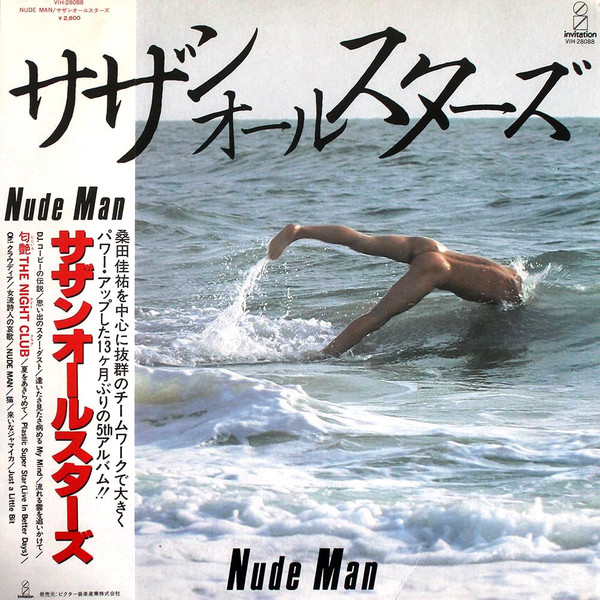
Chu Kosaka (小坂忠), born July 8, 1948, is a Japanese singer-songwriter, gospel singer, and pastor, but back in the day he was one of the pioneers of Japanese pop music. Born Masayuki Kosaka (小坂正行), he began his musical journey with the Group Sounds band, The Floral in 1966. When The Floral broke up, Kosaka and fellow bandmates Eiji Kikuchi (菊池英二) and Hiro Yanagida (柳田博義) went on to form the band Apryl Fool alongside fellow pioneers Haruomi Hosono (細野晴臣) and Takashi Matsumoto (松本隆). The same year, he turned down joining Hosono's next band, Happy End in pursuit of a solo career, which he began as a performer in the original cast for Japan's first rock musical "Hair". He would make his solo debut in 1971 with Arigatou (ありがとう) and would culminate with his magnum opus, HORO(ほうろう). Kosaka's 1975 album HORO belongs on the list of pre-Sugar Babe albums that would provide the foundation of modern City Pop, especially since many consider this to be the forerunner of modern Japanese R&B, or as they called it, Wasei-R&B (和製R&B). Before this album was released, Kosaka's previous 3 albums took on more of a folk-rock sound akin to Buffalo Springfield or Moby Grape, thanks to the help of legendary rock band Happy End for the first album and Kosaka's own band, Four Joe Half (it's a pun that in Japanese translates to Yojohan/四畳半) for the next 2. However, Kosaka admits that he was originally into soul music, citing his first favorite singer growing up as Ray Charles. So for his 4th record, he reached out to Haruomi Hosono to help co-produce, of course, Hosono brought Tin Pan Alley along for the ride to help recreate that soulful sound. The record also features Akiko Yano (矢野顕子) on the keyboard, although at this time she was still Akiko Suzuki (鈴木晶子), and her future (ex)husband, Makoto Yano (矢野誠) handling string & horn arrangements. The albums chorus included Minako Yoshida(吉田美奈子), Taeko Ohnuki(大貫妙子)and Tatsuro Yamashita (山下達郎), the latter two still performing as Sugar Babe at the time.
THE MUSIC
- Horo(ほうろう): ⭐⭐⭐⭐⭐
- Kikansha(機関車):⭐⭐⭐
- Bon Voyage Warf (ボン・ボヤージ波止場) : ⭐⭐⭐⭐
- Winter Storm Sketch (氷雨月のスケッチ): ⭐⭐⭐⭐
- Yugata Love(ゆうがたラブ): ⭐⭐⭐⭐⭐
- Shirakechimauze(しらけちまうぜ) : ⭐⭐⭐⭐⭐
- Meteor City (流星都市): ⭐⭐⭐⭐⭐
- Tsurube Ito(つるべ糸): ⭐⭐⭐
- Furaibo (ふうらい坊): ⭐⭐⭐⭐⭐
THE VERDICT: ⭐⭐⭐⭐

Most city pop records have a big city aesthetic to them however, HORO's unique blend of folk, blues & R&B gives the record a down-home feel to it. Instead of New York or LA, Kosaka takes us on a tour through an old coastal town, possibly Burbon Street in Louisiana. Kosaka himself has a great bluesy voice that lends well to the roots feel of the music. The added string arrangements in certain songs add a layer of Philidelphia-soul to put a bowtie on an otherwise grittier sound.
The titular song HORO is a funky rhythm & blues number that sets the mood for the album. Songs like Kikansha & Tsurube Ito still retain much of Kosaka's folk roots while leaning into a bit of blues & gospel music with the organ. Kikansha in particular shows up in Kosaka's first 2 albums and progressively gets more bluesy with each recording. Bon Voyage Warf shifts gears into full-on soul with a jazzy beat set to the ticking of a clock. While not derivative of it, the song creates a vibe very similar to Otis Redding's Sitting On The Dock of the Bay, it's a quiet song that makes you feel self-reflective while staring out into the ocean. Yougata Love takes you to church as it dives deeper into the funk side of things and mixes it with a little gospel with the funky organ and the upbeat chorus break down. Songs like Shirakechimause and Meteor City bring us closer to that contemporary City Pop sound with an uptempo strut, a light-hearted chorus, and funky guitar riffs. Winter Storm Sketch and Furaibo are excellent renditions of Happy End classics, Winter Sketch Storm in particular have a great honky tonk vibe to it.

Overall Chu Kosaka's HORO stands out as a bluesy City Pop album that provides more of a down-to-earth sound than most other records and is easily Chu Kosaka's best album up to this point. The best part is that we have the choice of the original and the remake he did in 2010. HORO 2010 is definitely its own experience since we get to hear an older more seasoned Kosaka sing classic tracks that have been remastered for the 21st century. You won't go wrong with either choice.







No comments:
Post a Comment